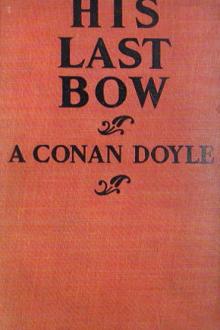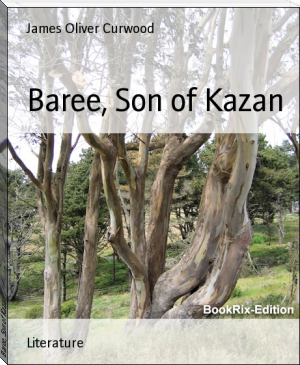Flower of the North, James Oliver Curwood [most popular novels of all time txt] 📗

- Author: James Oliver Curwood
Book online «Flower of the North, James Oliver Curwood [most popular novels of all time txt] 📗». Author James Oliver Curwood
benches, with deep cushion seats of greenish leather, were arranged about the table. These same curious seats furnished other parts of the room. From the pictures on the walls to the ancient helmet and cuirass that stood up like a legless sentinel in one corner, this room, like the others, breathed of extreme age. Over a big open fireplace, in which half a dozen birch logs were burning, hung a number of old-fashioned weapons; a flintlock, a pair of obsolete French dueling pistols, a short rapier similar to that which Pierre wore, and two long swords. Philip noticed that about each of the dueling pistols was tied a bow of ribbon, dull and faded, as though the passing of generations had robbed them of beauty and color, to be replaced by the somberness of age.
During the meal Philip could not but observe that Jeanne was laboring under some mysterious strain. Her cheeks were brilliantly flushed, and her eyes were filled with a lustrous brightness that he had never seen in them before. Their beauty was almost feverish. Several times he caught a strange little tremor of her white shoulders, as though a sudden chill had passed through her. He discovered, too, that Pierre was observing these things, and that there was something forced in the half-breed's cheerfulness. But D'Arcambal and Otille seemed completely oblivious of any change. Their happiness overflowed. Philip thought of his last supper at Churchill, with Eileen Brokaw and her father. Miss Brokaw had acted strangely then, and had struggled to hide some secret grief or excitement, as Jeanne was struggling now.
He was glad when the meal was finished, and the master of Fort o' God rose from his seat. At D'Arcambal's movement his eyes caught Jeanne's, and then he saw that Pierre was looking sharply at him.
"Jeanne owes you an apology--and an explanation, M'sieur Philip," said D'Arcambal, resting a hand upon Jeanne's head. "We are going to retire, and she will initiate you into the fold of Fort o' God."
Pierre and Otille followed him from the room. For the first time in an hour Jeanne laughed frankly at Philip.
"There isn't much to explain, M'sieur Philip," she said, rising from her seat. "You know pretty nearly all there is to know about Fort o' God now. Only I am sure that I did not appear to value your confidence very much--a little while ago. It must have seemed ungrateful in me, indeed, to have told you so little about myself and my home, after what you did for Pierre and me. But I have father's permission now. It is the second time that he has ever given it to me."
"And I don't want to hear," exclaimed Philip, bluntly. "I have been more or less of a brute, Miss Jeanne. I know enough about Fort o' God. It is a glorious place. You owe me nothing, and for that reason--"
"But I insist," interrupted the girl. "Do you mean to say that you do not care to listen, when this is the second time in my life that I have had the opportunity of talking about my home? And the first--didn't give me any pleasure. This will."
A shadow came into Jeanne's eyes. She motioned him to a seat beside her in front of the fire. Her nearness, the touch of her dress, the sweet perfume of her presence, thrilled him. He felt that the moment was near when the whole world as he knew it was to slip away from him, leaving him in a paradise, or a chaos of despair. Jeanne looked up at the dueling pistols. The firelight trembled in the soft folds of lace over her bosom; it glistened in her hair, and lighted her face with a gentle glow.
"There isn't much to explain," she said again, in a voice so low that it was hardly more than a whisper. "But what little there is I want you to know, so that when you go away you will understand. More than two hundred years ago a band of gentlemen adventurers were sent over into this country by Prince Rupert to form the Hudson's Bay Company. That is history, and you know more of it, probably, than I. One of these men was Le Chevalier Grosellier. One summer he came up the Churchill, and stopped at the great rock on which we saw the sun setting to-night, and which was called the Sun Rock by the Indians. He was struck by the beauty of the place, and when he went back to France it was with the plan of returning to build himself a chateau in the wilderness. Two or three years later he did this, and called the place Fort o' God. For more than a century, M'sieur, Fort o' God was a place of revel and pleasure in the heart of this desolation. Early in the nineteenth century it passed into the hands of a man by the name of D'Arcy, and it is said that at one time it housed twenty gentlemen and as many ladies of France for one whole season. Its history is obscure, and mostly lost. But for a long time after D'Arcy came it was a place of adventure, of pleasure, and of mystery, very little of which remains to-day. Those are his pistols above the fire. He was killed by one of them out there beside the big rock, in a quarrel with one of his guests over a woman. We think--here--from letters that we have found, that her name was Camille. There is a chest in my room filled with linen that bears her name. This dress came from that chest. I have to be careful of them, as they tear very easily. After D'Arcy the place was almost forgotten and remained so until nearly forty years ago when my father came into possession of it. That, M'sieur, is the very simple story of Fort o' God. Its old name is forgotten. It lives only with us. Others know it as D'Arcambal House."
"Yes, I have heard of that," said Philip.
He waited for Jeanne, and saw that her fingers were nervously twisting a bit of ribbon in her lap.
"Of course, that is uninteresting," she continued. "You can almost guess the rest. We have lived here--alone. Not one of us has ever felt the desire to leave this little world of ours. It is curious --you may scarcely believe what I say--but it is true that we look out upon your big world and laugh at it and dislike it. I guess-- that I have been taught to hate it--since I can remember."
There was a little tremble in Jeanne's voice, an instant's quivering of her chin. Philip looked from her face into the fire, and stared hard, choking back words which were ready to burst from his lips. In place of them he said, with a touch of bitterness in his voice:
"And I have grown to hate my world, Jeanne. It has compelled me to hate it. That is why I spoke to you that night on the cliff at Churchill."
"I have sometimes thought that I have been very wrong," said the girl. "I have never seen this other world. I know nothing of it, except as I have been taught. I have no right to hate it, and yet I do. I have never wanted to see it. I have never cared to know the people who lived in it. I wish that I could understand, but I cannot; except that father has made for us, for Pierre and Otille and me, this little world at Fort o' God, and has taught us to fear the other. I know that there is no other man in the whole world like my father, and that what he has done must be best. It is his pride that we bring your world to our doors, but that we never go to it; he says that we know more about that world than the people who live there, which of course cannot be so. And so we have grown up amid the old memories, the pictures, and the dead romances of Fort o' God. We have taken pleasure in living as we do--in making for ourselves our own little social codes, our childish aristocracy, our make-believe world. It is the spirit of Fort o' God that lives with us, and makes us content; the shadow- faces of men and women who once filled these rooms with life and pleasure, and whose memory seems to have passed into our keeping alone. I know them all; many of their names, all of their faces. I have a daguerreotype of Camille Poitiers, and she must have been very beautiful. There are the tiniest slippers in the world in her chest, and ribbons like those which are tied about the pistols. There is a painting of D'Arcy in your room. It is the picture next to the one that has its face turned to the wall."
She rose to her feet, and Philip stood beside her. There was a mist in her eyes as she held out her hand to him.
"I--I--would like to have you--see that picture," she whispered.
Philip could not speak. He held the hand Jeanne had given him as they passed through the long, dimly lighted halls. At the open door to his room they stopped, and he could feel Jeanne trembling.
"You will tell me--the truth?" she begged, like a child. "You will tell me what you think--of the picture?"
"Yes."
She went in ahead of him and turned the frame so that the face in the picture smiled down upon them in all of its luring loveliness. There was something pathetic in the girl's attitude now. She stood under the picture, facing Philip, and there was a tense eagerness in her eyes, a light that was almost supplication, a crying out of her soul to him in a breathless moment that seemed hovering between pain and joy. It was Jeanne, an older Jeanne, that looked from out of the picture, smiling, inviting admiration, bewildering hi her beauty; it was Jeanne, the child, waiting for him in flesh and blood to speak, her eyes big and dark, her breath coming quickly, her hands buried in the deep lace on her bosom. A low word came to Philip's lips, and then he laughed softly. It was a laugh, almost under his breath, which sweeps up now and then from a soul in a joy--an emotion--which is unutterable in words. But to Jeanne it was different. Her dark eyes grew hurt and wounded, two great tears ran down her paling cheeks, and suddenly she buried her face in her hands and with a sobbing cry turned from him, with her head bowed under the smiling face above.
"And you--you hate it, too!" she sobbed. "They all hate it-- Pierre--father--all--all hate it. It must--it must be bad. They hate her--every one--but me. And--I love her so!"
Her slender form shook with sobs. For a moment Philip stood like one struck dumb. Then he sprang to her and caught her close in his arms.
"Jeanne--Jeanne--listen," he cried. "To-night I looked at that picture before I went to see your father, and I loved it because it is like you. Jeanne, my darling, I love you--I love you--"
She was panting against his breast. He covered her face with kisses. Her sweet lips were not turned from him, and there filled her eyes a sudden light that made him almost sob in his happiness.
"I love you, I love you," he repeated, again and again, and he could find no other words than those.
For an instant her arms clung about his shoulders, and then, suddenly, they strained against him, and she tore herself free, and, with a cry so pathetic that it seemed as though her heart had broken in
During the meal Philip could not but observe that Jeanne was laboring under some mysterious strain. Her cheeks were brilliantly flushed, and her eyes were filled with a lustrous brightness that he had never seen in them before. Their beauty was almost feverish. Several times he caught a strange little tremor of her white shoulders, as though a sudden chill had passed through her. He discovered, too, that Pierre was observing these things, and that there was something forced in the half-breed's cheerfulness. But D'Arcambal and Otille seemed completely oblivious of any change. Their happiness overflowed. Philip thought of his last supper at Churchill, with Eileen Brokaw and her father. Miss Brokaw had acted strangely then, and had struggled to hide some secret grief or excitement, as Jeanne was struggling now.
He was glad when the meal was finished, and the master of Fort o' God rose from his seat. At D'Arcambal's movement his eyes caught Jeanne's, and then he saw that Pierre was looking sharply at him.
"Jeanne owes you an apology--and an explanation, M'sieur Philip," said D'Arcambal, resting a hand upon Jeanne's head. "We are going to retire, and she will initiate you into the fold of Fort o' God."
Pierre and Otille followed him from the room. For the first time in an hour Jeanne laughed frankly at Philip.
"There isn't much to explain, M'sieur Philip," she said, rising from her seat. "You know pretty nearly all there is to know about Fort o' God now. Only I am sure that I did not appear to value your confidence very much--a little while ago. It must have seemed ungrateful in me, indeed, to have told you so little about myself and my home, after what you did for Pierre and me. But I have father's permission now. It is the second time that he has ever given it to me."
"And I don't want to hear," exclaimed Philip, bluntly. "I have been more or less of a brute, Miss Jeanne. I know enough about Fort o' God. It is a glorious place. You owe me nothing, and for that reason--"
"But I insist," interrupted the girl. "Do you mean to say that you do not care to listen, when this is the second time in my life that I have had the opportunity of talking about my home? And the first--didn't give me any pleasure. This will."
A shadow came into Jeanne's eyes. She motioned him to a seat beside her in front of the fire. Her nearness, the touch of her dress, the sweet perfume of her presence, thrilled him. He felt that the moment was near when the whole world as he knew it was to slip away from him, leaving him in a paradise, or a chaos of despair. Jeanne looked up at the dueling pistols. The firelight trembled in the soft folds of lace over her bosom; it glistened in her hair, and lighted her face with a gentle glow.
"There isn't much to explain," she said again, in a voice so low that it was hardly more than a whisper. "But what little there is I want you to know, so that when you go away you will understand. More than two hundred years ago a band of gentlemen adventurers were sent over into this country by Prince Rupert to form the Hudson's Bay Company. That is history, and you know more of it, probably, than I. One of these men was Le Chevalier Grosellier. One summer he came up the Churchill, and stopped at the great rock on which we saw the sun setting to-night, and which was called the Sun Rock by the Indians. He was struck by the beauty of the place, and when he went back to France it was with the plan of returning to build himself a chateau in the wilderness. Two or three years later he did this, and called the place Fort o' God. For more than a century, M'sieur, Fort o' God was a place of revel and pleasure in the heart of this desolation. Early in the nineteenth century it passed into the hands of a man by the name of D'Arcy, and it is said that at one time it housed twenty gentlemen and as many ladies of France for one whole season. Its history is obscure, and mostly lost. But for a long time after D'Arcy came it was a place of adventure, of pleasure, and of mystery, very little of which remains to-day. Those are his pistols above the fire. He was killed by one of them out there beside the big rock, in a quarrel with one of his guests over a woman. We think--here--from letters that we have found, that her name was Camille. There is a chest in my room filled with linen that bears her name. This dress came from that chest. I have to be careful of them, as they tear very easily. After D'Arcy the place was almost forgotten and remained so until nearly forty years ago when my father came into possession of it. That, M'sieur, is the very simple story of Fort o' God. Its old name is forgotten. It lives only with us. Others know it as D'Arcambal House."
"Yes, I have heard of that," said Philip.
He waited for Jeanne, and saw that her fingers were nervously twisting a bit of ribbon in her lap.
"Of course, that is uninteresting," she continued. "You can almost guess the rest. We have lived here--alone. Not one of us has ever felt the desire to leave this little world of ours. It is curious --you may scarcely believe what I say--but it is true that we look out upon your big world and laugh at it and dislike it. I guess-- that I have been taught to hate it--since I can remember."
There was a little tremble in Jeanne's voice, an instant's quivering of her chin. Philip looked from her face into the fire, and stared hard, choking back words which were ready to burst from his lips. In place of them he said, with a touch of bitterness in his voice:
"And I have grown to hate my world, Jeanne. It has compelled me to hate it. That is why I spoke to you that night on the cliff at Churchill."
"I have sometimes thought that I have been very wrong," said the girl. "I have never seen this other world. I know nothing of it, except as I have been taught. I have no right to hate it, and yet I do. I have never wanted to see it. I have never cared to know the people who lived in it. I wish that I could understand, but I cannot; except that father has made for us, for Pierre and Otille and me, this little world at Fort o' God, and has taught us to fear the other. I know that there is no other man in the whole world like my father, and that what he has done must be best. It is his pride that we bring your world to our doors, but that we never go to it; he says that we know more about that world than the people who live there, which of course cannot be so. And so we have grown up amid the old memories, the pictures, and the dead romances of Fort o' God. We have taken pleasure in living as we do--in making for ourselves our own little social codes, our childish aristocracy, our make-believe world. It is the spirit of Fort o' God that lives with us, and makes us content; the shadow- faces of men and women who once filled these rooms with life and pleasure, and whose memory seems to have passed into our keeping alone. I know them all; many of their names, all of their faces. I have a daguerreotype of Camille Poitiers, and she must have been very beautiful. There are the tiniest slippers in the world in her chest, and ribbons like those which are tied about the pistols. There is a painting of D'Arcy in your room. It is the picture next to the one that has its face turned to the wall."
She rose to her feet, and Philip stood beside her. There was a mist in her eyes as she held out her hand to him.
"I--I--would like to have you--see that picture," she whispered.
Philip could not speak. He held the hand Jeanne had given him as they passed through the long, dimly lighted halls. At the open door to his room they stopped, and he could feel Jeanne trembling.
"You will tell me--the truth?" she begged, like a child. "You will tell me what you think--of the picture?"
"Yes."
She went in ahead of him and turned the frame so that the face in the picture smiled down upon them in all of its luring loveliness. There was something pathetic in the girl's attitude now. She stood under the picture, facing Philip, and there was a tense eagerness in her eyes, a light that was almost supplication, a crying out of her soul to him in a breathless moment that seemed hovering between pain and joy. It was Jeanne, an older Jeanne, that looked from out of the picture, smiling, inviting admiration, bewildering hi her beauty; it was Jeanne, the child, waiting for him in flesh and blood to speak, her eyes big and dark, her breath coming quickly, her hands buried in the deep lace on her bosom. A low word came to Philip's lips, and then he laughed softly. It was a laugh, almost under his breath, which sweeps up now and then from a soul in a joy--an emotion--which is unutterable in words. But to Jeanne it was different. Her dark eyes grew hurt and wounded, two great tears ran down her paling cheeks, and suddenly she buried her face in her hands and with a sobbing cry turned from him, with her head bowed under the smiling face above.
"And you--you hate it, too!" she sobbed. "They all hate it-- Pierre--father--all--all hate it. It must--it must be bad. They hate her--every one--but me. And--I love her so!"
Her slender form shook with sobs. For a moment Philip stood like one struck dumb. Then he sprang to her and caught her close in his arms.
"Jeanne--Jeanne--listen," he cried. "To-night I looked at that picture before I went to see your father, and I loved it because it is like you. Jeanne, my darling, I love you--I love you--"
She was panting against his breast. He covered her face with kisses. Her sweet lips were not turned from him, and there filled her eyes a sudden light that made him almost sob in his happiness.
"I love you, I love you," he repeated, again and again, and he could find no other words than those.
For an instant her arms clung about his shoulders, and then, suddenly, they strained against him, and she tore herself free, and, with a cry so pathetic that it seemed as though her heart had broken in
Free e-book «Flower of the North, James Oliver Curwood [most popular novels of all time txt] 📗» - read online now
Similar e-books:





Comments (0)